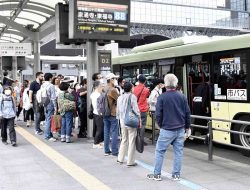Workplace Accidents Involving Foreign Workers Soaring; Number of Deaths Plus Injuries Hits Record High in 2023

A Vietnamese woman who had to take a leave of absence due to a work-related accident is seen. “It is difficult to find a job now [because of the accident],” she said.
16:26 JST, November 21, 2024
Along with the increase in the number of foreigners working in Japan, the number of work-related accidents involving them has also been rising sharply.
Last year, the number of foreign workers killed and wounded reached a record high of 5,672, including 32 fatalities.
One factor behind this situation is that foreign workers are engaged in work without acquiring sufficient knowledge of the Japanese language or sufficient safety awareness.
As the government has been increasing the acceptance of foreign workers amid the declining population, the issue of strengthening safety measures in the workplace has become a matter of urgency.
Absent from work and in debt
“I felt so much pain that I almost passed out. I never thought that something like this would happen to me in Japan, a country where I came to work,” lamented a Vietnamese woman, 28, who was working at a seaweed manufacturing plant in Saitama Prefecture.
Last December, she was working on a machine that cuts seaweed finely while applying heat. The woman accidentally put her right hand into the machine, and it got caught on a rotating blade. She was seriously injured and had to have her hand amputated at the wrist.
She came to Japan in October 2022 as a technical intern trainee to support a family of six living in a rural area in northern Vietnam.
She could speak only simple Japanese and learned the work procedures and how to use the machine by watching other people. She said she had never received sufficient explanations about the possible dangers involved in the work or the precautions workers were supposed to take.
She was hospitalized for four months and afterward it was inevitable that she had to take a leave of absence. Although she was recognized as eligible for work-related accident compensation, the amount of the temporary disability benefit was approximately 80% of her wage, which was less than ¥200,000, making her life harder and making it more difficult to send money to her family back home.
In addition, she still has nearly ¥900,000 in debt as she borrowed money to pay brokerage fees to the agency in Vietnam that sent her to Japan.
She is a single mother and has a 7-year-old son back home.
“I want to earn as much money as possible. However, with one of my hands like this, it will be difficult to find work not only in Japan but even in Vietnam,” she said. “I have nothing but anxiety.”
Rudimentary mistakes conspicuous
According to the Health, Labor and Welfare Ministry, the number of foreigners working in Japan reached a record high of about 2.04 million as of October 2023.
The number of deaths due to work-related accidents and injuries resulting in four or more days of absence from work has also been increasing steadily. Last year, the number of foreign workers killed or wounded reached 5,672, or 3.3 times the figure in 2014.
By business sector, the manufacturing and construction industries alone accounted for more than 60% of the total. Work in the “technical intern training program,” which is supposed to transfer skills to developing countries, and in the program for “specified skilled workers,” which will allow mid- to long-term employment, often involves heavy labor.
The incidence of work-related accidents per 1,000 workers was 4.1 in the technical intern training program, and 4.31 in the specified skilled workers, figures much higher than the overall rate of 2.36 for all workers, including Japanese.
The errors that have occurred most are often rudimentary ones, such as a mistake in following the operational procedure of a machine and a failure to wear safety equipment.
The labor ministry believes that many foreign workers have been facing a language barrier and do not fully understand the dangers involved at their workplaces.
Inadequate safety measures taken and instruction provided by the companies have also been pointed out as factors.
According to Posse, a Tokyo-based NPO that supports foreign workers, there have recently been cases such as employees being forced to work in high places without lifelines or being sent to work sites without having received prior training.
“There are many small and midsize companies that regard foreigners as ‘cheap labor’ and will not spend even the minimum cost for their safety,” said Makoto Iwahashi, a counselor at Posse.
Using manga and pictograms
To support safety education for foreign workers, the ministry has made manga teaching materials in 14 languages, including Vietnamese, Indonesian and Burmese. The materials show precautions that workers should take in 17 industries, including manufacturing and welding, by referring to past incidents. The ministry encourages companies to make use of these materials.
In addition, the ministry plans this fiscal year to create about 30 kinds of illustrations and pictograms that will enable people to learn at a glance about dangerous actions that must be avoided.
In July, the ministry established a study group comprising occupational safety consultants and language experts. The group will consider designs and wording that will be effective in preventing work-related accidents.
‘Training and Employment Program’
In place of the technical internship system, which has been criticized for elements such as long working hours, the government has established the “Training and Employment Program” aimed at fostering and securing foreign human resources.
Its objective is to improve the working environment by, for instance, allowing foreign workers to change jobs within the same industry, thus enabling Japan to become a “country of choice” for foreigners. The new system is scheduled to begin by 2027.
The government has also decided to accept up to 820,000 foreigners with specified skills over the next five years, up from about 210,000 at the end of last year.
“Unless proper safety education is provided in the workplace, work-related accidents will continue to increase, never enabling Japan to become a country of choice,” said Hiroki Ishiguro, a lawyer familiar with the problems foreign workers face. “The government should also consider strengthening the support system, such as by providing a service to connect interpreters with companies that provide safety education.”
Related Tags
Top Articles in Society
-

Producer Behind Pop Group XG Arrested for Cocaine Possession
-

Man Infected with Measles Reportedly Dined at Restaurant in Tokyo Station
-

Man Infected with Measles May Have Come in Contact with Many People in Tokyo, Went to Store, Restaurant Around When Symptoms Emerged
-

Woman with Measles Visited Hospital in Tokyo Multiple Times Before Being Diagnosed with Disease
-

Australian Woman Dies After Mishap on Ski Lift in Nagano Prefecture
JN ACCESS RANKING
-

Producer Behind Pop Group XG Arrested for Cocaine Possession
-

Japan PM Takaichi’s Cabinet Resigns en Masse
-

Man Infected with Measles Reportedly Dined at Restaurant in Tokyo Station
-

Israeli Ambassador to Japan Speaks about Japan’s Role in the Reconstruction of Gaza
-

Videos Plagiarized, Reposted with False Subtitles Claiming ‘Ryukyu Belongs to China’; Anti-China False Information Also Posted in Japan
























